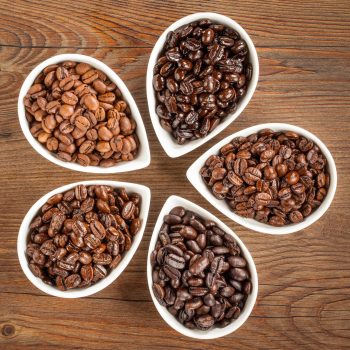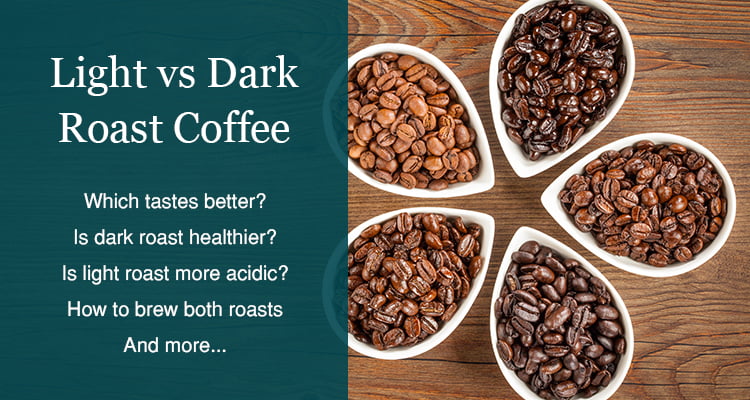

Some coffees can taste fruity and bright, others taste deep, dark and even smoky. Often a question of light vs dark roast coffee.
Some have the smoothness of chocolate and caramel whereas others are described as ‘tea like’ and exhibit delicate and botanical flavours.
When it comes to how our coffee tastes, there’s a lot to consider.
However, the reason some coffee beans taste more intense than others isn’t necessarily about the origin, the climate or how the beans are processed (although these factors do play a part.) The most pronounced flavour of the coffee is usually determined by how intensely the beans are roasted. Light and dark roasts are the first indicator of what your coffee is going to taste like.
So what are the main differences between light vs dark roasts?
In this article we’ll compare how they taste, the best suited brew methods and address some frequently asked questions.
In this article we will be sharing the key differences between light and dark roast coffees . We will also discuss the best products and the perfect way to brew them.
Does Light Roast Coffee Have More Caffeine?
Contrary to popular belief, light roast coffee generally has a slightly higher caffeine content than dark roast coffees. It is thought that dark roast coffees have more caffeine due to their stronger flavour and perceived ‘kick’. However, the reality is that caffeine levels are relatively stable during roasting, meaning it doesn’t significantly break down or disappear with increased roasting time.
The misconception arises because darker roasts tend to have a bolder flavour and a more pronounced bitterness, which can be associated with a stronger caffeine kick. In reality, the difference in caffeine content between light and dark roast coffees is minimal. The variation is primarily influenced by factors such as the type of coffee beans used, brewing method and serving size.
It’s worth noting that while light roast coffee may have a slightly higher caffeine content, it often has a milder taste compared to darker roasts. The flavour profile of coffee can vary significantly depending on the roast level, so personal preference should always be the guiding factor when choosing between light and dark roast coffee.
What Is Light Roast Coffee?
Light roast coffee refers to a type of profile that is lighter in colour and flavour compared to darker roasts. During the roasting process, coffee beans are roasted to varying profiles to bring out different flavours and characteristics. Light roast coffee is roasted for a shorter duration at lower temperatures, which results in a lighter brown colour and preserves more of the bean’s natural acidity and delicate flavours.
Light roast coffee typically has a milder and more nuanced taste compared to darker roasts. It often exhibits floral, fruity or tea-like flavours and may have a higher caffeine content. The lighter roast allows the inherent flavours and aromas of the coffee beans to shine through, making it a popular choice among those who enjoy the natural complexities and subtleties of the coffee’s origin.
What Does a Light Roast Coffee Taste Like?
Light roast coffee typically has a brighter and more acidic taste compared to darker roasts. The flavours of light roast coffee can vary depending on the origin of the beans and the specific characteristics of the coffee, but there are some common traits you might expect:
Bright and vibrant: Light roast coffee often has a lively and crisp acidity that gives it a bright and tangy taste. This acidity can be reminiscent of citrus fruits such as lemons and oranges.
Floral and tea-like: Lighter roasts tend to bring out the floral and tea-like qualities of the coffee beans. You might notice hints of floral notes, such as jasmine or lavender, as well as herbal or botanical notes.
Fruity and berry like: Light roast coffees often showcase fruity flavours, such as berries, cherries, or tropical fruits. These fruity notes can be subtle or more pronounced, depending on the specific coffee beans or the processing method used.
Delicate and nuanced: Lighter roasts retain more of the natural flavours and nuances of the coffee beans. You may detect more subtle and complex flavours, allowing you to appreciate the unique characteristics of the coffee’s origin.
Light body: Light roast coffee tends to have a lighter body or mouthfeel compared to darker roasts. This means it may feel lighter and less heavy on the palette.
How To Brew Light Roast Coffee
We’ve established that overall, light roast coffee offers a more delicate and nuanced taste experience, allowing you to explore the distinct flavours and aromas of the coffee beans. It is often favoured by those who enjoy a brighter and more complex cup of coffee. If you usually take your coffee with milk, light roasts are a good place to start if you’d like to try drinking it black. There’s a natural sweetness that comes through that makes it (surprisingly) palatable. Although milk can enhance this sweetness, it can also mask some of the natural flavours.
What to look for: Coffee beans that are light brown in colour, they tend to be less oily and have a more pronounced acidity.
Tips: Use the proper coffee-to-water ratio for your desired strength. As a general guide, a ratio of 1:16 is a good place to start. That’s 1 part coffee to 16 parts water.
Our Favourite Light Roast Coffees
The three coffees below are the best examples of the factors we’ve discussed above. They’re the perfect examples of coffees that have retained their diverse and interesting flavour profiles. They’re best suited for filter methods such as the Aeropress or V60.
What Is Dark Roast Coffee?
Dark roast coffee refers to coffee beans that have been roasted for a longer period of time (sometimes as little as 1-2 extra minutes!), resulting in a darker colour and stronger flavour profile. This roasting process typically leads to a more pronounced bitterness and reduced acidity in the coffee. The beans often have a shiny, oily surface due to the caramelisation of sugars during roasting. Dark roast coffees can have a smoky, chocolaty, or nutty undertone and are commonly associated with names like ‘French Roast’ or ‘Italian Roast’
What Does Dark Roast Coffee Taste Like?
Dark roast coffee tends to have a bolder and more robust flavour compared to lighter roasts. It often has a smoky, slightly bitter taste with less acidity. The longer roast time typically produces flavours like chocolate, caramel or even a hint of spice. However the exact flavour can vary based on the specific beans and roasting techniques used, and of course- origin and processing methods.
How To Brew Dark Roast Coffee
Dark roast coffee is usually best suited for espresso, it often creates a rich and bold espresso with intense flavours. The robustness of the dark roast can stand up well to the concentrated brewing process of espresso, resulting in a strong and flavourful shot.
The choice of coffee beans, including their roast level, can significantly influence the taste of your espresso. Dark roast beans tend to have a lower acidity and more pronounced caramelised and chocolaty notes, which can contribute to creating the ideal good espresso. However, personal preference and the equipment you have available plays a part. Dark roast coffees can be suited to full-immersion brew methods such as cafetière or Aeropress.
Dark Roast Coffee Vs Light Roast – Final Considerations
It’s worth considering that terminology and roasting processes can vary among different coffee Roasters and regions. What is considered a light roast at one Roastery may be considered a medium roast in another. It’s always a good idea to check your local coffee Roasters descriptions to get a better understanding of the roast levels, and also to remain open minded about perhaps trying a coffee that you wouldn’t usually consider.
For example: Our Indonesian Java is incredibly popular amongst those who like a full roast. Papua New Guinea- although a medium roast, is one of our top recommendations for a close alternative. This takes into account the quality of the crop and the processing method. Because of these factors, Papua New Guinea is naturally full bodied and has a deep, rich flavour- characteristics that are usually associated with a slightly higher roast.

